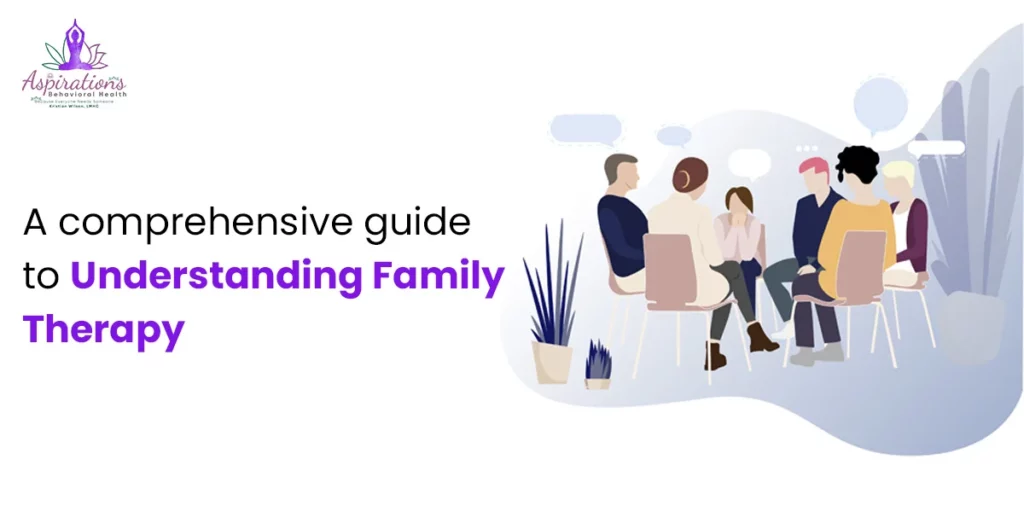If you or a loved one is struggling with familial relationship issues, family therapy sessions may provide the support you need. Family therapy is a form of counseling that addresses the unique challenges and dynamics within a family unit. It can help members better understand one another, improve communication, and foster healthier relationships.
This section will provide an in-depth overview of family therapy sessions. We will explore the various techniques, approaches, interventions, and goals involved in family therapy. By understanding the fundamentals of family therapy, you can gain insight into how it can positively impact family dynamics.
Takeaway
- Family therapy is a form of counseling that addresses familial relationship issues.
- Techniques, approaches, interventions, and goals are integral to family therapy sessions.
- Understanding the fundamentals of family therapy can provide insight into how it can improve family dynamics.
- Family therapy sessions can allow family members to express themselves openly without fear of judgment or criticism.
- Therapists adapt interventions to suit changing needs, ensuring the therapeutic process remains relevant and impactful.
What Is Family Therapy?
If you’re wondering what family therapy is, it’s a form of counseling that involves working with families and couples to improve their relationships. Family therapists help families and couples identify and address the underlying issues causing tension or dysfunction in their relationships. Family therapy sessions generally involve multiple family members or couples, including children, parents, grandparents, siblings, and other relatives.
Understanding the Role of Family Therapy
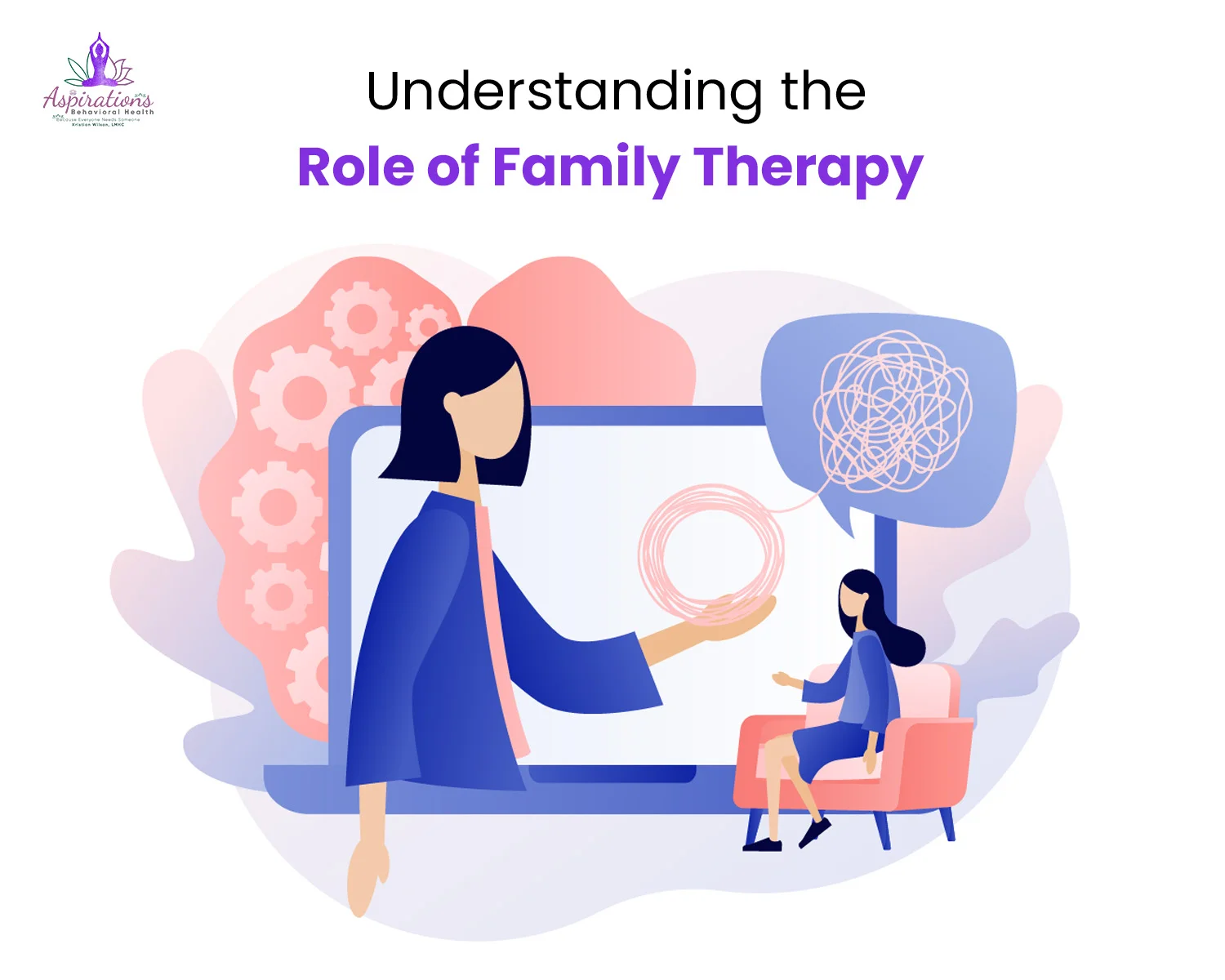 Family therapy sessions typically involve a series of steps that are designed to help families identify and address their unique challenges. The process can be broken down into several stages, including assessment, goal-setting, and the implementation of various therapeutic techniques.
Family therapy sessions typically involve a series of steps that are designed to help families identify and address their unique challenges. The process can be broken down into several stages, including assessment, goal-setting, and the implementation of various therapeutic techniques.
The therapist will try to understand the family’s dynamics, strengths, and weaknesses better. They may ask questions about the family’s history, communication patterns, and relationships. This information will help them develop a treatment plan tailored to the family’s needs.
How does family counseling work?
Family counseling sessions involve the entire family attending therapy together. This therapy aims to improve communication, promote understanding, and build stronger relationships within the family unit.
Understanding the different types of therapy available for each family member is essential to ensure that every individual receives the support they need. By addressing each family member’s unique needs, family therapy can facilitate a more productive and transformative therapeutic process.
Main Types of Family Counseling
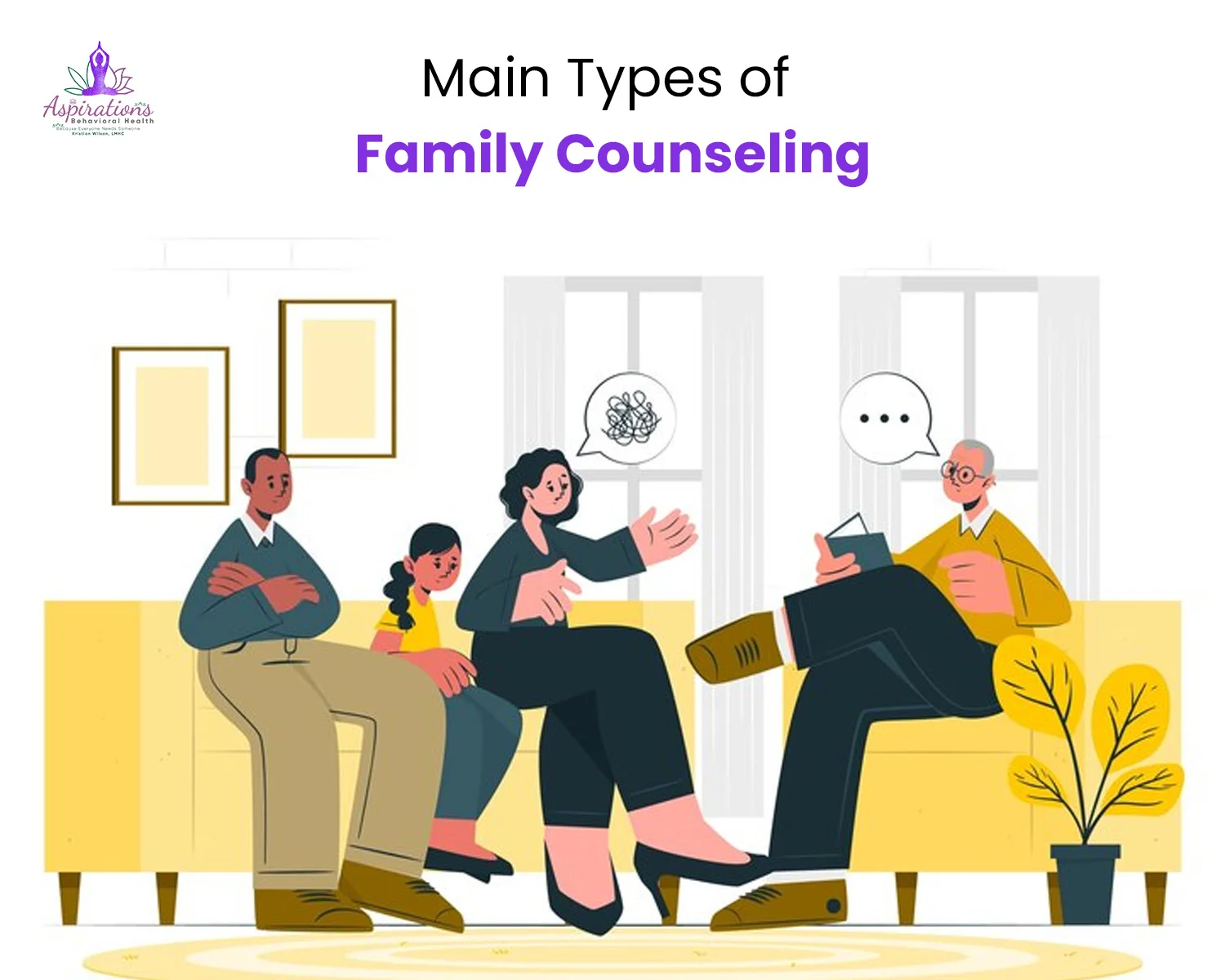 Family therapy acknowledges that each family member is unique and requires individual attention and tailored support. Here, we will explore the different types of therapy available to address the specific needs of each family member.
Family therapy acknowledges that each family member is unique and requires individual attention and tailored support. Here, we will explore the different types of therapy available to address the specific needs of each family member.
Supportive Family Therapy
Blended families face unique challenges, such as adjusting to new family dynamics and managing new family relationships. Blended family therapy involves addressing these issues in a supportive, non-judgmental environment to foster healthy relationships.
Cognitive-Behavioral Therapy
Family therapy can be approached from different theoretical perspectives, including systems theory, cognitive-behavioral therapy, psychodynamic therapy, and humanistic therapy. Each approach emphasizes a unique understanding of family dynamics and guides the therapeutic process accordingly.
Psychodynamic ideas
In family therapy, psychodynamic ideas explore how unconscious dynamics, generational patterns, and unresolved conflicts within family members influence relational dynamics and contribute to presenting issues.
Systemic Family Therapy
Systemic Family Therapy examines family dynamics as interconnected patterns. It emphasizes understanding relationships, communication, and behaviors within the family system, aiming to create positive change by addressing systemic influences on individuals.
What Does A Family Counselor Do?
A family counselor plays a pivotal role in untangling the complexities of familial relationships, creating a nurturing environment where open dialogue can thrive. Their expertise lies in deciphering the intricate dynamics that contribute to challenges within the family unit.
Conducting comprehensive assessments is a cornerstone of their work, allowing them to gain profound insights into the family’s distinctive dynamics and individual personalities. Skillfully employing psychodynamic ideas, they navigate the subconscious realms, bringing to light patterns and unresolved issues that may be at the core of familial struggles.
As guides through the therapeutic process, family counselors facilitate the development of healthy communication strategies. They teach family members effective ways to express themselves and actively listen, fostering mutual understanding. Interventions often involve imparting conflict resolution skills, promoting empathy, and encouraging the adoption of coping mechanisms.
6 Stages of Family Therapy
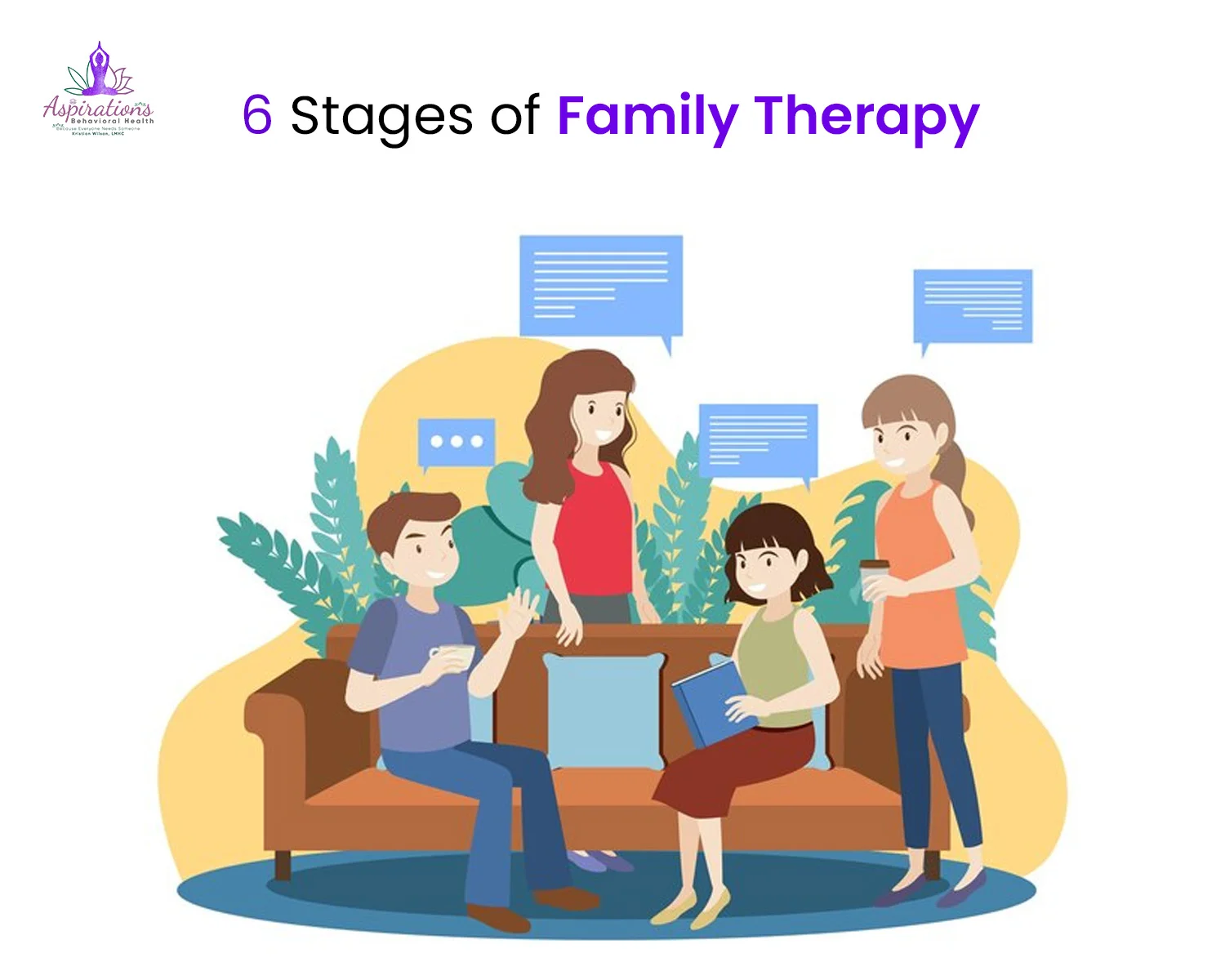 As you embark on this therapeutic process of the journey of family therapy, you’ll find that family therapy typically unfolds in six distinct stages, offering a structured roadmap for therapists and families.
As you embark on this therapeutic process of the journey of family therapy, you’ll find that family therapy typically unfolds in six distinct stages, offering a structured roadmap for therapists and families.
Assessment
At the onset, your family therapist will engage in a comprehensive assessment. This involves gathering information about family history, relationships, and the presenting issues. This stage sets the foundation for a tailored therapeutic approach, ensuring a nuanced understanding of the dynamics at play.
Formation of Therapeutic Alliance
Building a solid alliance between the family and the therapist is paramount. This stage fosters trust and open communication. Establishing a safe space encourages family members to share their thoughts and feelings, setting the stage for collaborative problem-solving.
Goal Setting:
Together with your therapist, you’ll identify specific, measurable goals for therapy. Whether improving communication, resolving conflicts, or enhancing overall family dynamics, articulating clear objectives provides a roadmap for the therapeutic journey.
Intervention and Change
In this stage, therapeutic techniques come into play. From psychodynamic ideas, therapists may explore unconscious dynamics, unresolved conflicts, and generational patterns influencing family interactions. Interventions aim to foster insight, promote understanding, and initiate positive changes.
Consolidation
As positive changes take root, the consolidation stage reinforces these improvements. Family members work together to solidify newfound strategies, coping mechanisms, and communication skills, promoting resilience in the face of future challenges.
Termination and Follow-Up
The final stage involves assessing the progress made and preparing for the conclusion of formal therapy. A well-executed termination allows for a smooth transition, and therapists may provide resources for ongoing support, ensuring the sustainability of positive changes achieved during therapy.
When Should a Family Go to Family Therapy?
Families should consider family therapy when facing challenges that strain relationships or hinder daily life. Seeking professional assistance during these times can strengthen family bonds, promote understanding, and equip members with the tools to navigate challenges more effectively. Invest in your family’s well-being by exploring the benefits of timely family therapy sessions.
Family issues
When family issues become overwhelming, affecting daily life and relationships, seeking family therapy can provide a constructive platform for addressing and resolving these challenges.
Marriage Problems
Couples grappling with marriage problems, such as communication breakdowns or conflicts, can benefit from family therapy to navigate these issues collectively and restore harmony.
Child and Adolescent issues
Family therapy addresses behavioral, emotional, or developmental challenges in children and adolescents, fostering a supportive environment for their growth and well-being.
Anxiety
For families contending with anxiety, whether it’s generalized or related to specific situations, family therapy offers a collaborative approach to understanding and managing anxiety collectively.
Depression
When depression affects a family member, family therapy can be a crucial support system, enabling open discussions and collaborative strategies to cope with the challenges associated with depression.
Low self-esteem
Family therapy becomes valuable when addressing low self-esteem, promoting positive reinforcement, and cultivating an environment that nurtures each member’s self-worth.
Life transitions
Family therapy can facilitate smoother adjustments during significant life transitions such as relocation, career changes, or retirement by providing a space for open communication and understanding.
Relationship concerns
Family therapy is beneficial for addressing relationship concerns among family members, fostering healthier interactions, and resolving conflicts constructively.
Gay, lesbian, and bisexual concerns
Families navigating issues related to sexual orientation can find support and understanding in family therapy, promoting acceptance and open communication.
Discrimination
When discrimination affects a family member, family therapy can provide a supportive space to address the emotional impact, foster resilience, and promote a united front against discrimination.
Loss and grieving
Family therapy becomes a crucial resource for families dealing with loss and grieving, offering a collective space to express emotions, find solace, and navigate the grieving process together.
Eating disorders
Family therapy becomes a crucial resource for families dealing with loss and grieving, offering a collective space to express emotions, find solace, and navigate the grieving process together.
Health-related issues
Families coping with health-related challenges can benefit from family therapy, which provides a space to address the emotional impact, enhance coping strategies, and foster mutual support.
Sexual harassment
When a family member faces sexual harassment, family therapy offers a supportive environment to address the emotional aftermath, navigate legal processes, and promote healing within the family unit.
Alcohol abuse
Family therapy is instrumental in addressing the complexities of alcohol abuse within a family, fostering understanding, and providing a collective approach to treatment and recovery.
What Are the Goals of Family Therapy?
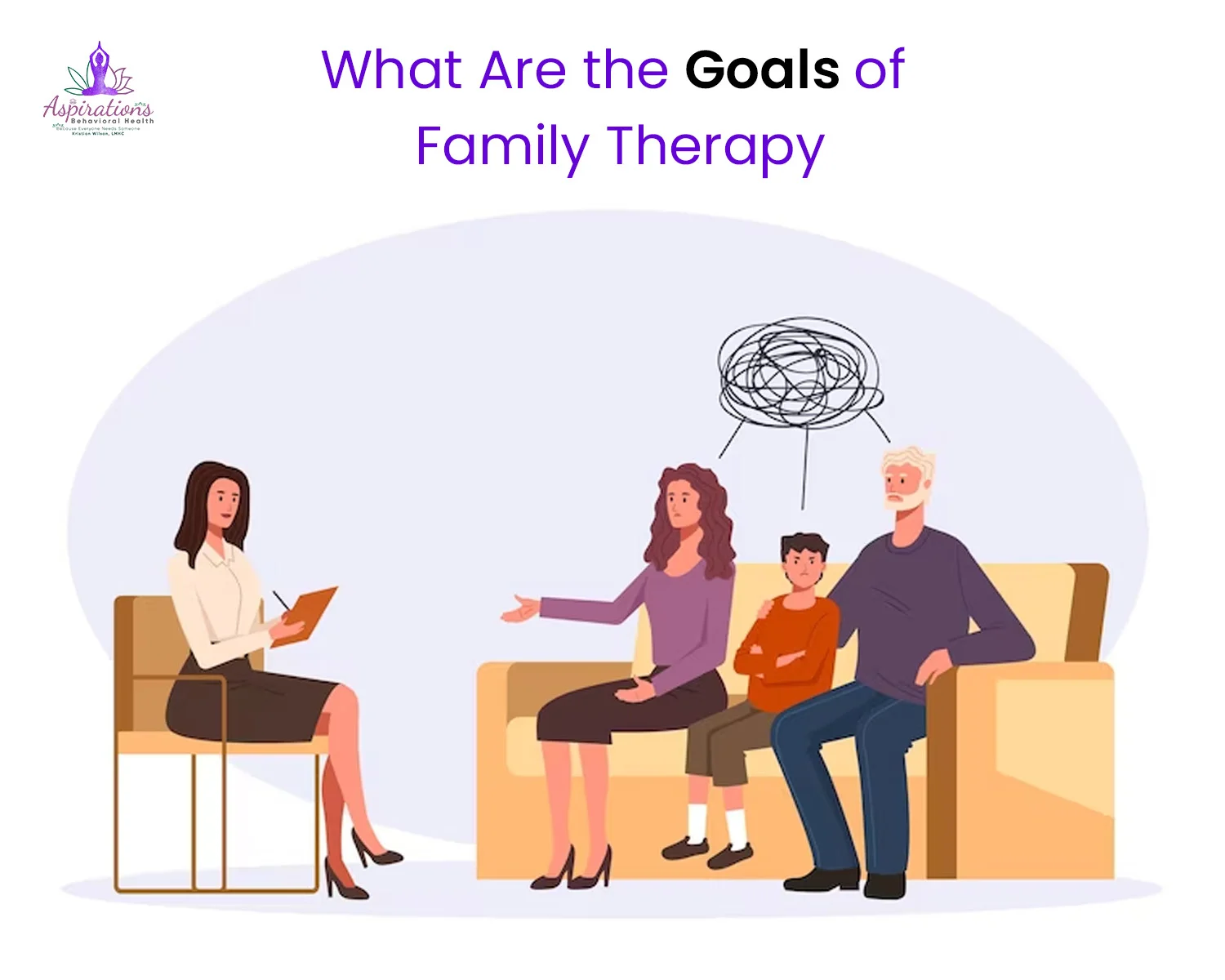
With the goals in place, the therapist will implement various therapeutic techniques to help the family achieve their objectives. These techniques may include role-playing, communication exercises, or behavioral interventions. The therapist may also assign homework assignments to reinforce the skills learned during therapy sessions.
The family therapy process can take several sessions, and progress may only sometimes be linear. However, with patience and commitment, families can learn to communicate more effectively, develop stronger relationships, and achieve their therapy goals.
- Family therapy aims to improve communication patterns within the family, fostering open dialogue, active listening, and practical expression of emotions to strengthen family connections.
- The goal is to identify and address conflicts constructively, promoting understanding and collaboration to minimize the impact of disagreements on family dynamics.
- Family therapy strives to establish and reinforce healthy boundaries within family relationships, ensuring a balance between autonomy and interconnectedness among family members.
- By assisting families in navigating life transitions, family therapy helps members adapt to changes, fostering resilience and providing tools to cope with new challenges.
- The therapeutic process aims to support the personal growth of each family member, fostering a nurturing environment that encourages self-esteem, autonomy, and a sense of belonging.
Some Family Therapy Techniques and Interventions
Family therapists use various techniques to facilitate change and promote better family communication. Some standard techniques include narrative, structural, strategic, and solution-focused therapy.
Genogram Construction
Family therapists often use genograms, visual representations of family structures and relationships over multiple generations. This tool helps identify patterns, conflicts, and strengths within the family system, offering valuable insights for therapeutic interventions.
Narrative Therapy
Narrative techniques involve exploring and reshaping the family’s stories about challenges, emphasizing strengths and resilience. By reframing narratives, family members can gain a new perspective on their experiences, fostering positive change and growth.
Structural Family Therapy
This intervention focuses on the family’s organization and structure. Therapists work to identify and modify dysfunctional patterns, hierarchies, and alliances, promoting healthier relationships and more adaptive family dynamics.
Strategic Family Therapy
Strategic therapy involves brief, solution-focused interventions. Therapists strategically assign tasks to family members, disrupt negative patterns, and encourage adaptive behaviors, aiming for efficient problem resolution and improved family functioning.
Emotionally Focused Family Therapy (EFFT)
EFFT targets emotional bonds within the family. By addressing and restructuring emotional responses, therapists help family members create secure attachments and develop healthier ways of relating to each other, fostering emotional well-being and connection.
What are the most important principles of family therapy?
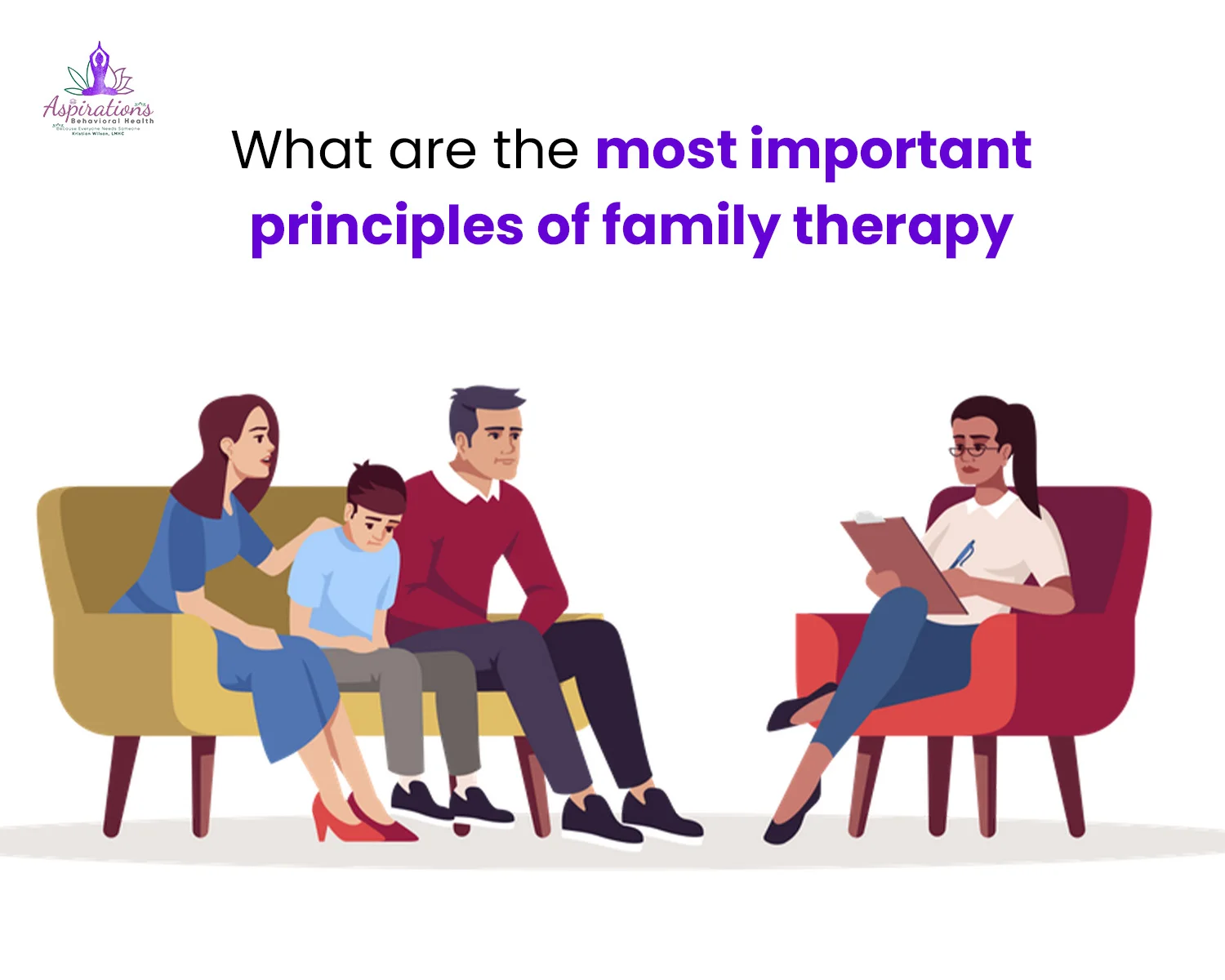 Family therapy’s most crucial principles emphasize the interconnectedness of individual behaviors within the family unit. This systemic understanding of familial dynamics guides these principles, which focus on enhancing communication, respecting diversity, and establishing healthy boundaries. Family therapists often employ a strengths-based perspective, identifying and leveraging existing family strengths and resources to facilitate positive change.
Family therapy’s most crucial principles emphasize the interconnectedness of individual behaviors within the family unit. This systemic understanding of familial dynamics guides these principles, which focus on enhancing communication, respecting diversity, and establishing healthy boundaries. Family therapists often employ a strengths-based perspective, identifying and leveraging existing family strengths and resources to facilitate positive change.
Systems Thinking
Family therapy operates on the principle of systems thinking, recognizing that individual behaviors are interconnected within the family unit. It aims to understand and address issues by examining their impact on the entire system.
Effective Communication
Effective communication is foundational. Therapists focus on improving communication patterns, fostering openness, and encouraging active listening to enhance understanding and connection among family members.
Respecting Diversity
Recognizing and respecting the diversity within families is crucial. Therapists promote an inclusive environment that acknowledges varying perspectives, cultural backgrounds, and individual differences to ensure tailored and culturally sensitive interventions.
Collaborative Approach
Family therapy thrives on collaboration. Therapists work with families as a team, involving all members in the therapeutic process. Collaborative efforts empower families to participate actively in problem-solving and decision-making.
Strengths-Based Perspective
The strengths-based approach emphasizes identifying and leveraging the family’s strengths and resources. Therapy aims to build resilience and facilitate positive changes within the family system by focusing on these positive aspects.
Flexibility and Adaptability
Family therapy embraces flexibility because families are dynamic and evolve over time. Therapists adapt interventions to suit the family’s changing needs, ensuring the therapeutic process remains relevant and practical.
What is the best way to conduct a family therapy session?
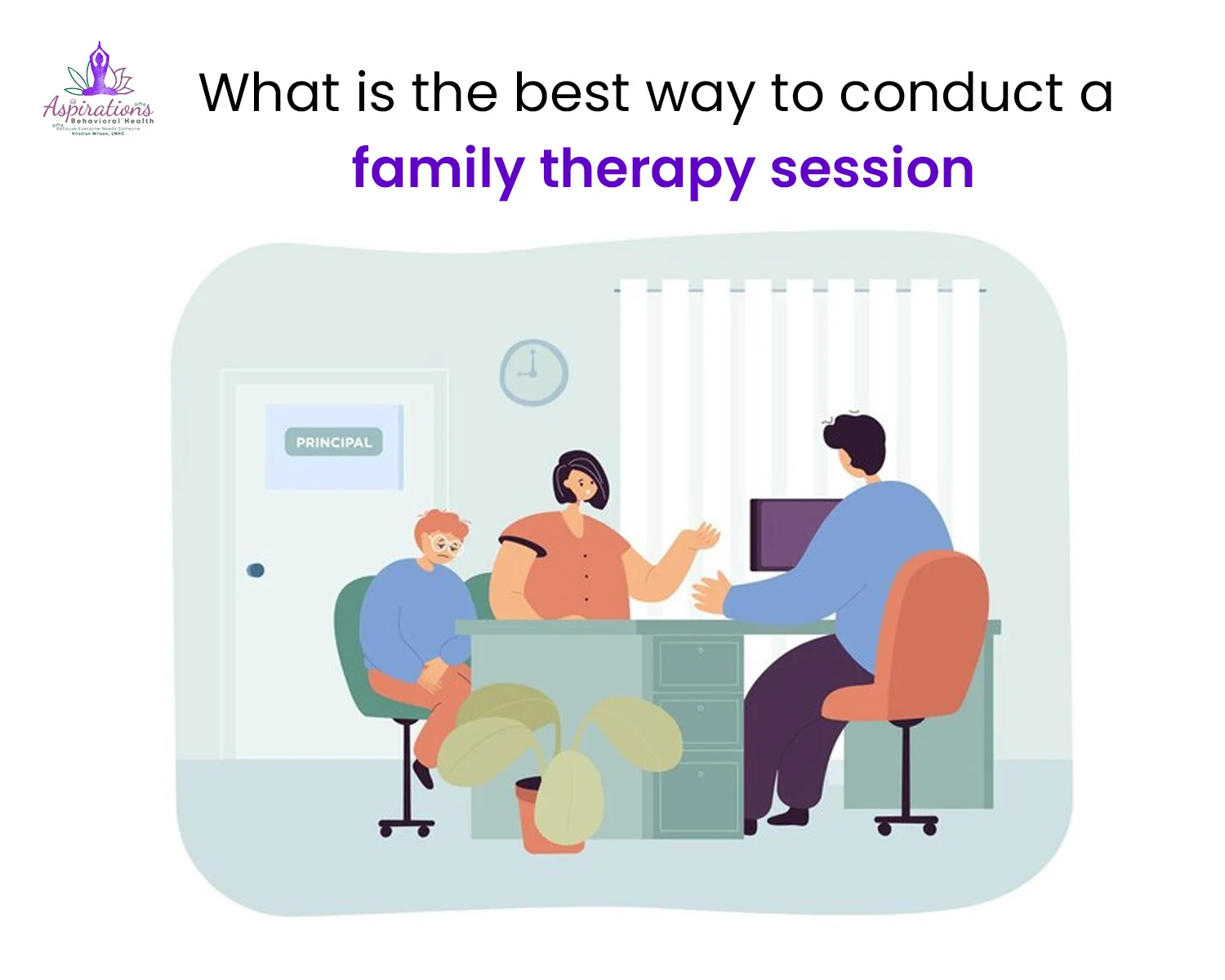 Discovering the best way to conduct a family therapy session involves several fundamental principles, each contributing to a holistic and targeted therapeutic experience. From establishing a safe environment to employing diverse therapeutic techniques, these strategies work in tandem to create a space where families can openly address challenges, set goals, and embark on a journey toward improved communication and stronger familial bonds.
Discovering the best way to conduct a family therapy session involves several fundamental principles, each contributing to a holistic and targeted therapeutic experience. From establishing a safe environment to employing diverse therapeutic techniques, these strategies work in tandem to create a space where families can openly address challenges, set goals, and embark on a journey toward improved communication and stronger familial bonds.
Establishing a Safe Environment
The foundation of a successful family therapy session lies in creating a safe and non-judgmental space. This fosters trust, encouraging open communication and a willingness among family members to share their thoughts and feelings.
Collaborative Goal Setting
Begin each session by collaboratively setting goals. This empowers the family to participate actively in their therapeutic journey, ensuring that the focus aligns with their needs and aspirations for positive change.
Systematic Assessment
Conduct a thorough systematic assessment to understand the family’s dynamics, strengths, and challenges. This helps tailor interventions to the family’s needs, ensuring a targeted and effective therapeutic approach.
Active Engagement of All Members
Engage all family members actively in the session. Each individual’s perspective is valuable, and involving everyone promotes a comprehensive understanding of the issues at hand, facilitating collective problem-solving and resolution.
Utilizing Therapeutic Techniques
Employ diverse therapeutic techniques based on the family’s unique dynamics. Techniques such as genogram construction, role-playing, and narrative therapy enhance the session’s effectiveness by addressing specific issues and promoting insight and change.
Encouraging Follow-Up and Homework
Conclude each session by encouraging follow-up activities or homework assignments. This fosters ongoing engagement with therapeutic concepts and promotes the application of new skills and strategies in the family’s daily life, enhancing the overall impact of the therapy.
What Therapy Is Best for Families?
Determining the best therapy for families depends on their specific needs and challenges. Family systems therapy is a comprehensive approach that delves into the family unit’s dynamics, roles, and relationships. This method, rooted in systemic thinking, addresses how individual behaviors impact the entire family system. It emphasizes communication enhancement, conflict resolution, and structural adjustments to foster a healthier familial environment.
When seeking therapy, families should consider their unique circumstances and consult with a qualified therapist to determine the most effective approach tailored to their situation.
Improve Your Family Relationships with My Online Family Counseling
Are you feeling the strain in your family relationships? At Aspirations Health, we understand that maintaining a harmonious family dynamic is essential for overall well-being. Our Online Family Counseling services are designed to bring you closer, fostering stronger connections and open communication.
Why Choose Aspirations Health for Your Family’s Well-being?
Tailored Treatment Plans
Our experienced therapists create personalized treatment plans for family therapy, addressing your unique dynamics and challenges. We understand that every family is different, and our tailored approach ensures effective and targeted interventions.
Expert Family Relationship Therapists
Our team consists of skilled and compassionate family relationship therapists who specialize in navigating the complexities of familial bonds. With a wealth of experience, they guide you through healing and growth.
Convenient Online Counseling
Embrace the convenience of online family counseling from the comfort of your home. Our virtual sessions allow flexibility without compromising the quality of therapeutic support, ensuring accessibility for your busy lifestyle.
Unlock the potential for improved family relationships with Aspirations Health. Our online family counseling services offer a pathway to healing and growth. Invest in your family’s well-being today by scheduling a session with our expert family relationship therapists. Your journey to a more connected and fulfilling family life starts here.
Aspirations Behavioral Health offers a wide range of services, including:
Online Individual Consultation And Coaching
Online Child And Adolescent Therapy
Conclusion
By now, you have gained a comprehensive understanding of family therapy sessions. You have learned about family therapists’ various techniques, approaches, and interventions and how they can positively impact family dynamics.
It’s important to note that family therapy is not solely reserved for families in crisis. Many families benefit from regular therapy sessions to maintain healthy relationships and prevent future conflicts.
Many family therapy programs are available if your family could benefit from therapy. These programs offer a range of family therapy tools, including communication exercises, conflict-resolution strategies, and relationship-building activities.
Remember that seeking help through family therapy is a sign of strength, not weakness. Investing in your relationships, you invest in your well-being and overall family dynamic.


